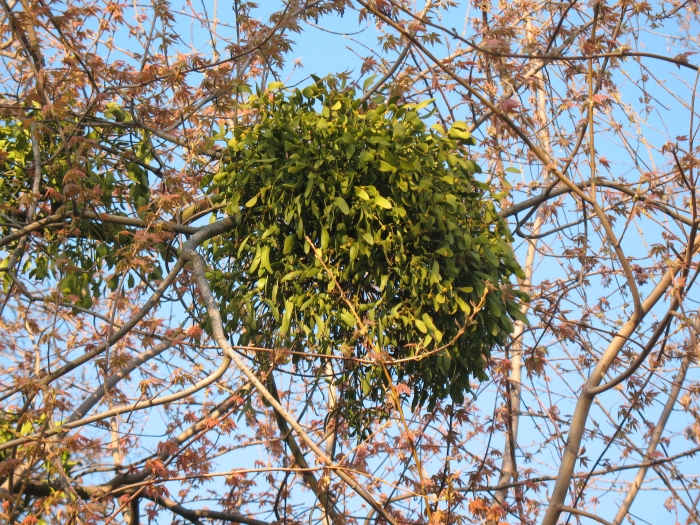European Mistletoe
(Viscum album)
European Mistletoe (Viscum album)
/
/

Victor Vizu
CC BY-SA 3.0
Image By:
Victor Vizu
Recorded By:
Copyright:
CC BY-SA 3.0
Copyright Notice:
Photo by: Victor Vizu | License Type: CC BY-SA 3.0 | License URL: https://creativecommons.org/licenses/by-sa/3.0 | Uploader: Vizu | Publisher: Wikipedia Commons |




























































Estimated Native Range
Summary
Viscum album, commonly known as European Mistletoe, is an evergreen hemiparasitic plant native to a variety of habitats including open woodlands, forest edges, and grasslands across Southern Europe, the Mediterranean, and Western Asia. It typically grows as a subshrub or shrub, forming dense clusters on the branches of host trees. European Mistletoe has stems 30–100 centimeters (12–39 inches) long with a characteristic dichotomous branching pattern. Its small, yellowish-green flowers are pollinated by insects and are generally inconspicuous, measuring 2–3 millimeters (0.079–0.118 inches) in diameter. The plant is particularly associated with broad-leaved trees such as apple, lime (linden), hawthorn, and poplar.
European Mistletoe is valued for its cultural significance, especially during the Christmas season when it is used for decoration and in festive traditions. It thrives in full sun and requires a host tree from which to draw water and nutrients. The plant prefers a range of soil drainage conditions from slow to fast. While mistletoe is not typically grown for its ornamental qualities, it is interesting for its unique growth habit and its role in folklore. Gardeners should be aware that it can weaken or even kill host trees and is considered a pest in some regions. Care should be taken to manage its spread to ensure the health of the host trees.CC BY-SA 4.0
European Mistletoe is valued for its cultural significance, especially during the Christmas season when it is used for decoration and in festive traditions. It thrives in full sun and requires a host tree from which to draw water and nutrients. The plant prefers a range of soil drainage conditions from slow to fast. While mistletoe is not typically grown for its ornamental qualities, it is interesting for its unique growth habit and its role in folklore. Gardeners should be aware that it can weaken or even kill host trees and is considered a pest in some regions. Care should be taken to manage its spread to ensure the health of the host trees.CC BY-SA 4.0
Plant Description
- Plant Type: Subshrub, Shrub
- Height: 1-3 feet
- Width: 1.5-3 feet
- Growth Rate: Slow
- Flower Color: N/A
- Flowering Season: Winter, Spring
- Leaf Retention: Evergreen
Growth Requirements
- Sun: Full Sun, Part Shade
- Water: Medium
- Drainage: Slow, Medium, Fast
Common Uses
Bird Garden, Butterfly Garden, Low Maintenance
Natural Habitat
Native to open woodlands, forest edges, and grasslands across Southern Europe, the Mediterranean, and Western Asia
Other Names
Common Names: Mistletoe, Mistelten, Mistel, Laubholz-Mistel, Gui, Baltais Amulis, Maretak
Scientific Names: , Viscum album, Viscum album var. album, Viscum album var. pini, Viscum alatum, Viscum austriacum subsp. pini, Viscum austriacum var. pini,
GBIF Accepted Name: Viscum album L.